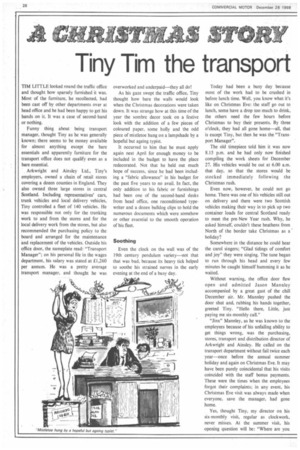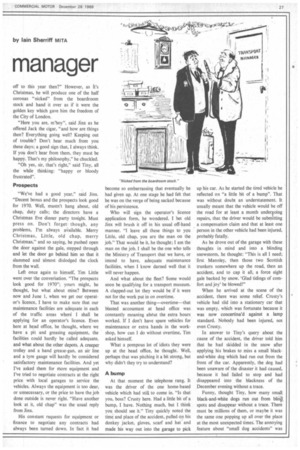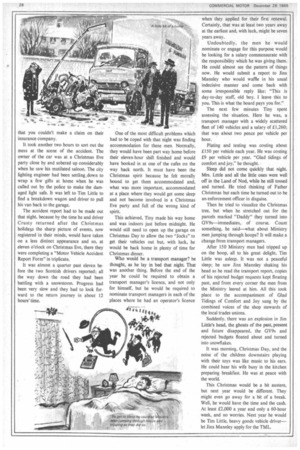Tiny Tim the transport manager
Page 28

Page 29

Page 30

If you've noticed an error in this article please click here to report it so we can fix it.
TIM LITTLE looked round the traffic office and thought how sparsely furnished it was. Most of the furniture, he recollected, had been cast off by other departments over at head office and he had been happy to get his hands on it. It was a case of second-hand or nothing.
Funny thing about being transport manager, thought Tiny as he was generally known; there seems to be money available for almost anything except the bare essentials and apparently furniture for the transport office does not qualify even as a bare essential.
Arkwright and Ainsley Ltd., Tiny's employers, owned a chain of retail stores covering a dozen counties in England. They also owned three large stores in central Scotland. Including representatives' cars, trunk vehicles and local delivery vehicles, Tiny controlled a fleet of 140 vehicles. He was responsible not only for the trunking work to and from the stores and for the local delivery work from the stores, but also recommended the purchasing policy to the board and arranged for the maintenance and replacement of the vehicles. Outside his office door, the nameplate read: "Transport Manager"; on his personal file in the wages department, his salary was stated at 11,260 per annum. He was a pretty average transport manager, and thought he was overworked and underpaid—they all do!
As his gaze swept the traffic office, Tiny thought how bare the walls would look when the Christmas decorations were taken down. It was strange how at this time of the year the sombre decor took on a festive look with the addition of a few pieces of coloured paper, some holly and the odd piece of mistletoe hung on a lampshade by a hopeful but ageing typist.
It occurred to him that he must apply again next April for enough money to be included in the budget to have the place redecorated. Not that he held out much hope of success, since he had been including a "fabric allowance" in his budget for the past five years to no avail. In fact, the only addition to his fabric or furnishings had been one of the second-hand desks from head office, one reconditioned typewriter and a dozen bulldog clips to hold the numerous documents which were somehow or other essential to the smooth operation of his fleet.
Soothing
Even the clock on the wall was of the 19th century pendulum variety—not that that was bad, because its heavy tick helped to soothe his strained nerves in the early evening at the end of a busy day. Today had been a busy day because most of the work had to be crushed in before lunch time. Well, you know what it's like on Christmas Eve: the staff go out to lunch, some have a drop too much to drink, the others need the few hours before Christmas to buy their presents. By three o'clock, they had all gone home—all, that is except Tiny, but then he was the "Transport Manager".
The old timepiece told him it was now 8.15 p.m. and he had only now finished compiling the work sheets for December 27. His vehicles would be out at .6.00 a.m. that day, so that the stores would be stocked immediately following the Christmas rush.
Even now, however, he could not go home. There was one of his vehicles still out on delivery and there were two Scottish vehicles making their way in to pick up two container loads for central Scotland ready to meet the pre-New Year rush. Why, he asked himself, couldn't these heathens from North of the border take Christmas as a holiday?
Somewhere in the distance he could hear the carol singers; "Glad tidings of comfort and joy" they were singing. The tune began to run through his head and every few minutes he caught himself humming it as he waited.
Without warning, the office door flew open and admitted Jason Mannley accompanied by a great gust of the chill December air. Mr. Mannley pushed the door shut and, rubbing his hands together, greeted Tiny. "Hello there, Little, just paying me six-monthly call."
"Jinx" Mannley, as he was known to the employees because of his unfailing ability to get things wrong, was the purchasing, stores, transport and distribution director of Arkwright and Ainsley. He called on the transport department without fail twice each year—once before the annual summer holiday and again on Christmas Eve. It may have been purely coincidental that his visits coincided with the staff bonus payments. These were the times when the employees forgot their complaints; in any event, his Christmas Eve visit was always made when everyone, save the manager, had gone home.
Yes, thought Tiny, my director on his six-monthly visit, regular as clockwork, never misses. At the summer visit, his opening question will be: "Where are you off to this year then?" However, as it's Christmas, he will produce one of the half coronas "nicked" from the boardroom stock and hand it over as if it were the golden key which gave him the freedom of the City of London.
"Here you are, m'boy", said Jinx as he offered Jack the cigar, "and how are things then? Everything going well? Keeping out of trouble? Don't hear much from you these days; a good sign that, I always think. If you don't hear from them, they must be happy. That's my philosophy," he chuckled.
"Oh yes, sir, that's right," said Tiny, all the while thinking: "happy or bloody frustrated".
Prospects "We've had a good year," said Jinx. "Decent bonus and the prospects look good for 1970. Well, mustn't hang about, old chap, duty calls; the directors have a Christmas Eve dinner party tonight. Must press on. Don't forget though, any problems, I'm always available. Merry Christmas, Little, old chap, merry Christmas," and so saying, he pushed open the door against the gale, stepped through and let the door go behind him so that it slammed and almost dislodged the clock from the wall.
Left once again to himself, Tim Little went over the converSation. "The prospects look good for 1970"; yours might, he thought, but what about mine? Between now and June 1, when we get our operator's licence, I have to make sure that our maintenance facilities are adequate in each of the traffic areas where I shall be applying for an operator's licence. Even here at head office, he thought, where we have a pit and greasing equipment, the facilities could hardly be called adequate, and what about the other depots. A creeper trolley and a hand grease-gun, an air line and a tyre gauge will hardly be considered satisfactory maintenance facilities. And yet I've asked them for more equipment and I've tried to negotiate contracts at the right price with local garages to service the vehicles. Always the equipment is too dear, or unnecessary, or the price to have the job done outside is never right. "Have another took at it, old chap" was the usual reply from Jinx.
His constant requests for equipment or finance to negotiate any contracts had always been turned down. In fact it had become so embarrassing that eventually he had given up. At one stage he had felt that he was on the verge of being sacked because of his persistence.
Who will sign the operator's licence application form, he wondered. I bet old Jinx will brush it off in his usual off-hand manner. "I leave all these things to you Little, old chap, you are the man on the job." That would be it, he thought; I am the man on the job. I shall be the one who tells the Ministry of Transport that we have, or intend to have, adequate maintenance facilities, when I know darned well that it will never happen.
And what about the fleet? Some would soon be qualifying for a transport museum. A clapped-out lot they would be if it were not for the work put in on overtime.
That was another thing—overtime—that blasted accountant at head office was constantly moaning about the extra hours worked. If I don't have spare vehicles for maintenance or extra hands in the workshop, how can I do without overtime, Tim asked himself.
What a pompous lot of idiots they were up at the head office, he thought. Well, perhaps that was pitching it a bit strong, but why didn't they try to understand?
A bump At that moment the telephone rang. It was the driver of the one home-based vehicle which had still to come in. "Is that you, boss? Crusty here. Had a little bit of a bump, I have. Nothing much, but I think you should see it." Tiny quickly noted the time and place of the accident, pulled on his donkey jacket, gloves, scarf and hat and made his way out into the garage to pick up his car. As he started the tired vehicle he reflected on "a little bit of a bump". That was without doubt an understatement. It usually meant that the vehicle would be off the road for at least a month undergoing repairs, that the driver would be submitting a compensation claim and that at least one person in the other vehicle had been injured, probably fatally.
As he drove out of the garage with these thoughts in mind and into a blinding snowstorm, he thought: "This is all I need; first Mannley, then those two Scottish trunkers somewhere up the road, then an accident, and to cap it all, a force eight gale backed by snow. 'Glad tidings of comfort and joy' be blowed!"
When he arrived at the scene of the accident, there was some relief. Crusty's vehicle had slid into a stationary car that was empty, which was fortunate because it was now concertina'd against a lamp standard. Nobody had been injured, not even Crusty.
In answer to Tiny's query about the cause of the accident, the driver told him that he had skidded in the snow after applying his brakes to miss a small blackand-white dog which had run out from the front of the car. Apparently, the dog had been unaware of the disaster it had caused, because it had failed to stop and had disappeared into the blackness of the December evening without a trace.
Funny, thought Tiny, how many small black-and-white dogs run out from bli4 spots and disappear without a trace. There must be millions of them, or maybe it was the same one popping up all over the place at the most unexpected times. The annoying feature about "small dog accidents" was that you couldn't make a claim on their insurance company.
It took another two hours to sort out the mess at the scene of the accident. The owner of the car was at a Christmas Eve party close by and sobered up considerably when he saw his mutilated saloon. The city lighting engineer had been settling down to wrap a few gifts at home when he was called out by the police to make the damaged light safe. It was left to Tim Little to find a breakdown wagon and driver to pull his van back to the garage.
The accident report had to be made out that night, because by the time he and driver Crusty returned after the Christmas holiday,s the sharp picture of events, now registered in their minds, would have taken on a less distinct appearance and so, at eleven o'clock on Christmas Eve, there they were completing a "Motor Vehicle Accident Report Form" in triplicate.
It was almost a quarter past eleven before the two Scottish drivers reported; all the way down the road they had been battling with a snowstorm. Progress had been very slow and they had to look forward to the return journey in about 12 hours' time. One of the most difficult problems which had to be coped with that night was finding accommodation for these men. Normally, they would have been part way home before their eleven-hour shift finished and would have booked in at one of the cafes on the way back north. It must have been the Christmas spirit because he felt morally bound to get them accommodated and, what was more important, accommodated at a place where they would get some sleep and not become involved in a Christmas Eve party and full of the wrong kind of spirit.
This achieved, Tiny made his way home and was indoors just before midnight. He would still need to open up the garage on Christmas Day to allow the two "Jocks" to get their vehicles out but, with luck, he would be back home in plenty of time for Christmas dinner.
Who would be a transport manager? he thought, as he lay in bed that night. That was another thing. Before the end of the year he could be required to obtain a transport manager's licence, and not only for himself, but he would be required to nominate transport managers in each of the places where he had an operator's licence when they applied for their first renewal. Certainly, that was at least two years away at the earliest and, with luck, might be seven years away.
Undoubtedly, the men he would nominate or engage for this purpose would be looking for a salary commensurate with the responsibility which he was giving them. He could almost see the pattern of things now. He would submit a report to Jinx Mannley who would waffle in his usual indecisive manner and come back with some irresponsible reply like: "This is day-to-day stuff, old boy. I leave this to you. This is what the board pays you for."
The next few minutes Tiny spent assessing the situation. Here he was, a transport manager with a widely scattered fleet of 140 vehicles and a salary of £1,260; that was about two pence per vehicle per hour.
Plating and testing was costing about £150 per vehicle each year. He was costing £9 per vehicle per year. "Glad tidings of comfort and joy," he thought.
Sleep did not come quickly that night. Mrs. Ltttle and all the little ones were well off in the Land of Nod, while he still tossed and turned. He tried thinking of Father Christmas but each time he turned out to be an enforcement officer in disguise.
Then he tried to visualize the Christmas tree, but when he stretched out for the parcels marked "Daddy" they turned into GV9s—immediates,. of course. Count something, he said—what about Ministry men jumping through hoops? It will make a change from transport managers.
After 150 Ministry men had tripped up on the hoop, all to his great delight, Tim Little was asleep. It was not a peaceful sleep; he saw Jinx Mannley shaking his head as he read the transport report, copies of his rejected budget requests kept floating past, and from every corner the men from the Ministry leered at him. All this took place to the accompaniment of Glad Tidings of Comfort and Joy sung by the combined voices of the shop stewards of the local trades unions.
Suddenly. there was an explosion in Jim Little's head, the ghosts of the past, present and future disappeared, the GV9s and rejected budgets floated about and turned into snowflakes.
It was morning, Christmas Day, and the noise of the children downstairs playing with their toys was like music to his ears. He could hear his wife busy in the kitchen preparing breakfast. He was at peace with the world.
This Christmas would be a bit austere, but next year would be different. They might even go away for a bit of a break. Well, he would have the time and the cash. At least £2,000 a year and only a 60-hour week, and no worries. Next year he would be Tim Little, heavy goods vehicle driver— let Jinx Mannley apply for the TML.












































































